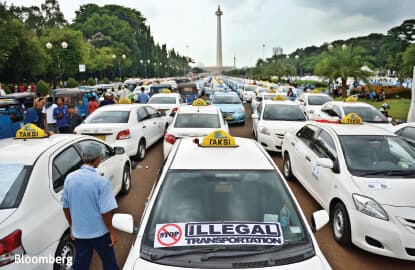
THE public has welcomed the Taxi Industry Transformation Programme (TITP) unveiled by Suruhanjaya Pengangkutan Awam Darat (SPAD) to change the way taxis operate and to regulate e-hailing services. But taxi drivers and operators are strongly against the move.
The Malaysian Taxi Drivers Transformation Association (Pers1m) has warned that taxi drivers will stage a six-day protest against the decision to regulate Uber and Grab instead of banning them.
Their anger is understandable. The TITP provides consumers with more choice and better service but for licensed taxi drivers, many of whom are struggling to make ends meet, it means having to share the pie with non-traditional rivals.
The taxi industry is also said to be a cash cow for politicians to grease their political machine.
The threat by Pers1m notwithstanding, SPAD and the government are not expected to waver on the transformation plan, which is probably the most popular decision the ruling party has made in recent years, after the Bantuan Rakyat 1Malaysia cash handouts.
It is also one of very few policy changes that have received the support of the opposition.
Datuk Aslah Abdullah, president of the Taxi Operator Association of Wilayah Persekutuan and Selangor, has opted to wait for the outcome of the proposed regulation of e-hailing apps before acting.
For the time being, he is investing in a better meter and tracking system for his company Destination Transport (M) Sdn Bhd’s fleet and in an e-hailing app to compete with Uber and Grab in this country.
“If the government wants to regulate Uber and Grab, we too can be like them. I can have my taxi fleet as well as my e-hailing service,” he says.
State assemblyman of Bukit Gasing, Rajiv Rishyakaran, says it is good that the government realises that technologies should not be held back to protect the interests of a few. However, he adds, SPAD has to engage the taxi drivers and guide them into making the transition to offering better services.
“The plan contains the recommendations I made last year. Taxi drivers have to realise that they cannot be protected forever. They have to learn how to move forward with technology. The rules of the game have changed. But it is daunting when the rules change drastically. SPAD has to help them make the transition,” Rajiv tells The Edge.
Plans to regulate e-hailing apps have met with fierce resistance in many countries the world over.
In Indonesia, although the operators of e-hailing apps, the Jakarta City Hall and the Ministry of Transport have reached a compromise and regulation is underway, police in the capital city have conducted raids and seized the cars of those providing e-hailing services. This was on the grounds that these drivers did not have the licence to provide public transport, although the Ministry of Transport has given them until Oct 1 to register their cars as commercial vehicles and undergo road safety tests.
In Hong Kong last year, police raided the local Uber office and arrested five drivers for the “illegal use of vehicles for hire”.
The same happened in China, where the authorities conducted raids on the offices of e-hailing services, alleging that the operations were unlicensed.
China will start regulating e-hailing apps in November this year with the operators required to keep information collected from their operations in the country for at least two years.
Whether overzealous Malaysian authorities take law into their own hands, disregarding the fact that a new regulation is underway, remains to be seen.
More should be done for taxi drivers
While praising SPAD for deciding to regulate e-hailing services instead of banning them, Rajiv says the commission should do more for taxi drivers so that they can compete better against Uber and Grab.
For instance, the authority should allow a more flexible taxi fare structure, he adds. Under the TITP, taxi fares will still be regulated by SPAD while e-hailing services can structure the fares themselves.
“SPAD could have a base rate but allow taxi drivers and operators to structure their own rates. This way, taxi drivers and operators can come up with promotions and products to differentiate themselves, therefore encouraging competition.
“For example, several taxi operators could form a consortium with its own corporate colour to differentiate its products and fare rates from the rest of the field,” says Rajiv.
Moving forward, what will happen to the country’s taxi industry once e-hailing apps are regulated? Rajiv believes the industry will still be relevant because as the country moves towards a higher concentration of public transport than private cars, taxis will be a crucial part of the system.
Save by subscribing to us for your print and/or digital copy.
P/S: The Edge is also available on Apple's AppStore and Androids' Google Play.